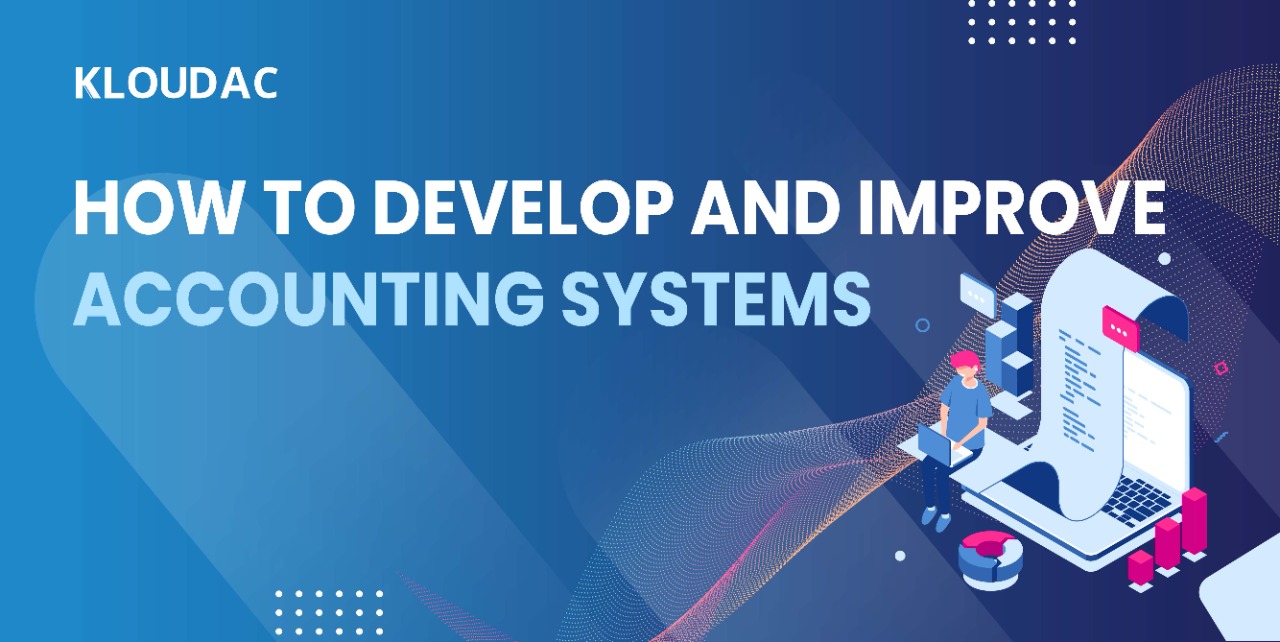Accounting systems help business owners measure business growth in terms of profitability. Good financial systems will also identify problems before they get out of hand. If you don’t know if your company has a strategy to develop, adopt and review accounting processes, now is the time to reconsider your accounting approach.
Using technology to optimize, automate, streamline and integrate as many steps of your company’s bookkeeping and accounting processes as possible will reduce your back-office burden immensely. Without a comprehensive accounting system, you’ll be operating your business in the financial dark and risk facing internal fraud, tax penalties, and possible failure.
Ways to develop, improve and optimize your accounting systems
1. Dedicated Business Accounts
Having a separate bank account keeps records distinct and will make life easier when it comes to tax time. Separating personal and business finances also protects your personal assets in the unfortunate case of bankruptcy. Most business checking accounts have higher fees than personal banking, so pay close attention to what you’ll owe.
2. Expense Management
You absolutely must have a system for managing employee expenses and reimbursing them. Your system should have processes in place for recording the expense (receipt tracking) and noting the purpose of the expense. If your employees do not have access to business credit or debit cards, you will also need to develop a standard process for expense reporting.
3. Accounts Payable / Receivable Management
Accounts receivable is your business’ lifeline for paying all of your bills on time or early. Without a thorough system for managing accounts payable, you risk your business’s reputation and the unnecessary expense of late fees and interest. Managing accounts receivable requires you to establish systems, policies, and procedures.
4. Automations to Consider
Business process automation can help you fulfill your business goals, but only if you use the right tools. Technology solutions have been developed to overcome almost every challenge. Look for scalable features and ongoing support, but don’t be afraid to make use of modern bookkeeping and accounting tools.
4.1 Select the Right Accounting Software
From the start, establish an accounting system for organizing receipts and other important records. Small/Medium businesses are most likely to use QuickBooks (43%). Other popular accounting software includes Xero, FreshBooks, Wave, and Sage. You can always consult a professional to get an understanding of which software would fit your business. You will be able to retrieve and review your income statements and balance sheets on a regular (monthly or quarterly) basis and always look at your business’s financial year as a whole with annual reports.
4.2 Data Management
Automated tools to retrieve data for you by way of optical character recognition (OCR), allowing you to automatically enter information into your accounting system are here. It may sound futuristic, but it’s not! This technology is available today by way of tools such as QBO (QuickBooks Online)
4.3 Expense Management
Imagine a company that has the ability to memorize your company’s unique expense management policies and automatically determines which expenses need a manager’s review and which can get automatic approval. Save time and money by not having to create and authorize manual spreadsheets, speeding up the approval process, and eliminating duplicate data entry.
4.4 Invoice Management
Automated invoicing is huge! Eliminate mistakes and shave tons of time off your accounting team’s monthly tasks with solutions such as Intuit Payment Solutions, which automates billing, collections, and cash application.
4.5 Sales Tax Reporting
Finding the best tool for this type of automation depends on your business. Big penalties can be involved if you get sales tax wrong. Establish a proactive plan and system for accounting and keeping up with sales taxes.
4.6 Paperwork Management
Back up your data. Cloud accounting provides some protection, but you should have plans in place for potential outages. You should also scan paper documents to have digital backups in the event of an emergency in the office. Convert physical files into digital files. Reduce the time required to move a bill, invoice, or receipt into the system where the data is required using a tool like Receipt Bank.
5. Find High-quality Accounting Partners
As a business owner, you’ll need a little extra financial planning help or guidance, there are a few individuals you might want to consider enlisting:
● Accountant. Accountants can advise at many different points, including your business structure, creating financial statements, obtaining necessary licenses and permits, and even writing a business plan.
● Certified public accountant (CPA). In the case of an audit, a CPA is the only individual who can legally prepare an audited financial statement.
● Bookkeeper. The bookkeeper manages the day-to-day records, regularly reconciling accounts, categorizing expenses, and managing accounts receivable/accounts payable.
● Tax preparer. Your tax preparer fills out necessary forms and may file them on your behalf during tax season. Some will also set up your estimated tax payments.
● Tax planner. These professionals help optimize your taxes before you file them, helping you learn ways to lower your tax burden.
KLOUDAC will help you design and establish smart and efficient bookkeeping and accounting processes that work for your business. We will save you time and money and provide you with the financial data you need to make strategic decisions. Partnering with Kloudac, your company will have access to a team of highly experienced, trained, and certified bookkeepers.
KLOUDAC Accounting Firm Dubai, UAE
KLOUDAC is a recognized accounting firm in Dubai, UAE with 15 years of service experience. We have built connections with over 500 customers. It has also won the certification of Xero Payroll and certification of Xero advisor from the world’s leading online accounting software – XERO. Moreover, KLOUDAC is a golden champion partner of Xero. Accounting and Bookkeeping are more convenient for the SMEs via KLOUDAC since they provide their clients with a whole package of services such as Financial Consultancy, Business setup, Audit and assurance services, Taxation services, Recognized accounting software, and more.
